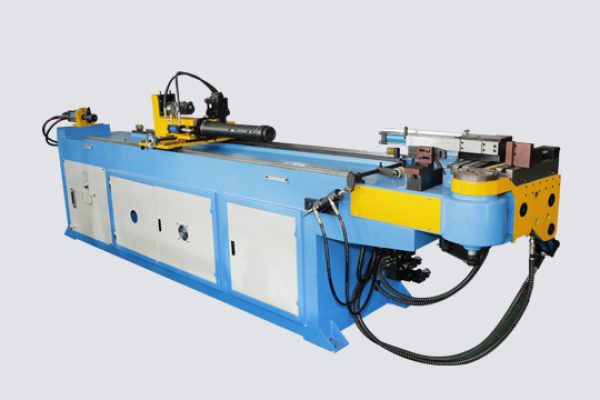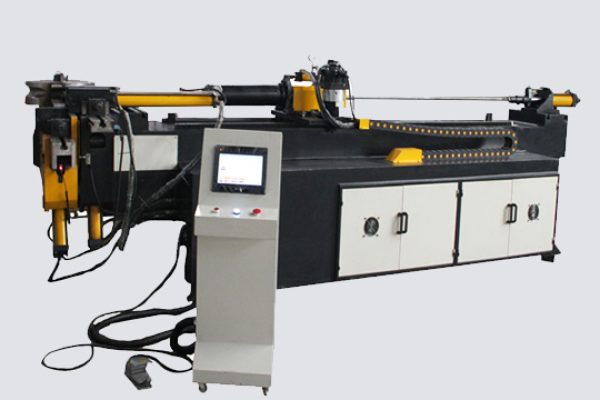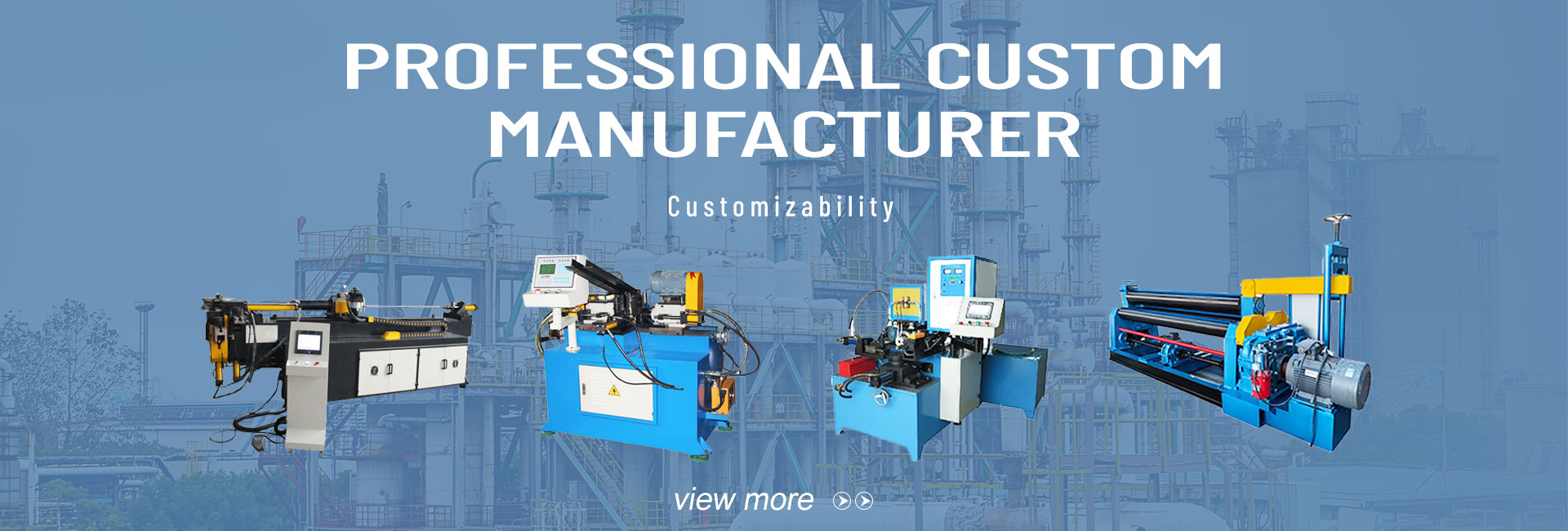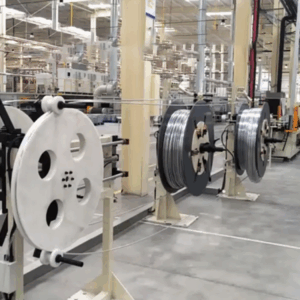
Pipe Bending Machine: Essential Tool for Forming Tubes
Pipe bending machine refers to a machine that can bend a metal tube into a specific angle or curve according to the requirements without deformation.
It is an important type of equipment in the field of manufacturing, especially in the automotive, construction, HVAC, and shipbuilding industries.
Modern pipe benders can provide higher accuracy, smoother bends, and faster speeds with the help of advanced control systems.
In addition, a pipe bending machine will also have better production efficiency, product consistency, and even safety when selecting the appropriate machine. Let’s find out how it works, what types there are, what benefits it has, and where it is used.


1. What Is a Pipe Bending Machine
Pipe bending machine is a machine tool used to bend pipes or tubes at a controlled angle.
It can use the force generated by hydraulic, electric, or mechanical drives to bend the workpiece into a curved shape.
The bending angle and radius of the machine can be set to multiple values with less distortion.
In addition, pipe bending machines can also be used on different materials, such as steel, aluminum, copper, stainless steel, and so on.
They are usually high in accuracy and reliability and have become an important part of modern tube fabrication workshops.
Learn more about our Tube Cutting Machine for complete tube processing solutions.
2. Classification of pipe bending machine
Pipe bending machine has different types to meet production requirements.
The following are the most popular categories:
A. Manual Pipe Bending Machine
- The most basic kind of machine is operated by hand.
- It’s suitable for small tasks or workshop repairs.
- Although it’s cheap, it may need more operator power and less precision.
B. Hydraulic Pipe Bending Machine
- Fluid pressure is used by a hydraulic pipe bending machine to provide bending force.
- You can expect a uniform output with powerful torque and smooth motion.
- This type of machine is suitable for medium to heavy-duty use.
C. CNC Pipe Bending Machine
- A CNC (Computer Numerical Control) bending machine can completely automate the process.
- Accurate angles, repeatable results, and faster cycle times are ensured.
- Digital input of bend information is one of its benefits that improves precision and reduces human error.
D. Electric Pipe Bending Machine
- Instead of hydraulics, this type uses servo motors.
- They are noiseless, efficient, and need less maintenance.
- Electric benders are frequently used in high-precision applications.
E. Semi-Automatic Pipe Bending Machine
- A semi-automatic model combines manual preparation with an automatic bending motion.
- It’s cost-effective and appropriate for small to medium production runs.
3. Working Principle of a Pipe Bending Machine
The pipe bending process can be divided into the following stages:
- Pipe Loading.The operator manually loads the pipe into the bending die.
- The clamp die clamps the tube tightly.
- The bending arm rotates around the die, bending the pipe.
- Angle Control.The sensors or encoder detect the bending angle with precision.
- The machine ejects the completed pipe to allow for the next run.
In addition, CNC systems perform most of these tasks automatically. Moreover, multi-axis movement is available, as is 3D pipe bending.
See pipe bending safety standards at search.osha.gov
4. Important Features and Benefits
A modern pipe bending machine has numerous benefits, which are:
- High Accuracy.Thanks to the CNC control system, the bending angle is very consistent.
- Fast Processing Speed. Automated pipe feeding and bending minimize the production cycle time.
- Smooth Surface.The formation process produces fewer wrinkles and surface scratches.
- Energy Savings.Electric systems reduce energy consumption.
- Versatile Designs.Available for round, square, and oval pipes.
- Emergency stop and overload protection make the machine safe to use.
In addition, most bending systems have an automatic tool changer. Furthermore, bending simulation software is often available.
5. Pipe Bending Machine Applications
Pipe bending machines are used in a variety of industries, such as:
- Exhaust systems, roll cages, and frames are made.
- Structural tubes, railings, and pipelines are produced.
- Curved metal furniture frames are formed.
- Copper and aluminum bends for air conditioning systems are made.
- Complex piping systems and rails are fabricated.
- Lightweight aluminum tubes are bent with high precision.
In addition, pipe bending machines are used to manufacture heat exchangers, boiler tubes, and industrial piping systems.
6. How to Select a Pipe Bending Machine
The following factors are essential when choosing a pipe bending machine:
- Pipe Material. Different metals require different bending force and tooling.
- Radius of Bend. Select the appropriate die set for the correct curvature.
- Pipe Diameter. The machine must support your specific range.
- Production Volume. Automatic or CNC bending systems for mass production.
- Manual or semi-automatic bending machines are cheaper.
In addition, you should pay attention to after-sales service, software compatibility, and safety certifications.
7. Pipe Bending Machine Maintenance
If you properly maintain a pipe bending machine, it will work more reliably and last longer.
Follow these simple tips:
- Clean the dies regularly to avoid scratches.
- Regularly lubricate all moving parts.
- Check hydraulic oil level and pressure.
- Inspect the clamping unit for wear and damage.
- Calibrate the angle sensors once a month.
Thanks to scheduled maintenance, the pipe bending machine will run smoothly and safely for many years.
8. Frequently Asked Questions (FAQ)
Q1: What materials can a pipe bending machine work on?
A: Common materials include steel, copper, aluminum, and stainless steel.
Q2: How precise are CNC pipe bending machines?
A: They have an accuracy of ±0.1°, suitable for high-precision bending tasks.
Q3: Can a single machine bend different diameters?
A: Yes, adjustable tooling can accommodate various tube diameters.
Q4: What is the difference between hydraulic and electric models?
A: Hydraulic models exert more force, while electric ones are quieter and cleaner.
Q5: How can tube wrinkling be avoided during bending?
A: Using a mandrel and proper lubrication helps support the inner wall of the tube.
9. Conclusion
In conclusion, the pipe bending machine is a crucial equipment in modern metal fabrication. It offers precise bending, smooth operation, and excellent repeatability. Whether you require manual, hydraulic, or CNC models, selecting the right type will ensure maximum efficiency.
Automation and digital control systems also offer improved flexibility and lower production costs. For industries that demand high accuracy and speed, investing in a reliable pipe bending machine is a smart decision.


